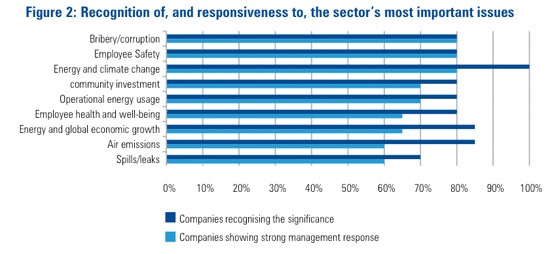ExxonMobil Takes Third Place in Big Oil Sustainability Rankings
<p>The latest industry rankings from Tomorrow's Value Rating looks at fossil fuel firms and finds that, despite solid leadership in innovation, the 10 largest companies are failing to take action on a number of environmental issues.</p>

Ranking the oil and gas industry on sustainability may be an endeavor prone to oxymorons, but a new report from Two Tomorrows has attempted just that, scoring the 10 largest fossil fuel companies on five categories of leadership.
The results show an industry that is by and large embracing innovation, but falling short on a number of other mission-critical areas, notably peak oil and climate change.
The top-ranked firm, British Petroleum -- which has in recent months stopped using its "Beyond Petroleum" slogan, backed off its renewables investments and left the U.S. Climate Action partnership last month -- scored 59 percent in the rankings. Second-place Shell Oil came in second with 55 percent, making those the only two firms to score above the 50 percent mark. ExxonMobil, perhaps the industry's biggest poster child for anti-climate change efforts, ranked third on the list with a score of 46 percent.
"Sustainability leaders in other industries are driving innovation within their products to address pressing sustainability challenges, and reaping the financial and reputational benefits," said Todd Cort from Two Tomorrows North America in a statement. "The oil and gas sector appears limited to a small number of important yet fragmented applications: Alternative energy technologies, more efficient methods for finding and extracting petroleum resources and innovations for safer and more efficient products."
The chart below, part of a much larger chart available in the free report, shows how many companies are "recognizing" the significance of important issues, compared with how many companies are showing a strong management response to those issues. This chart shows that 100 percent of the firms recognize the significance of climate change, but only 80 percent are showing a strong response. In the full chart, which you can see here, the concept of peak oil shows both low recognition, at 25 percent, and even lower response, with just 10 percent scoring in that category.

The five categories that the Tomorrow's Value Rating uses to calculate scores are: Strategy, innovation & leadership, governance, engagement, and value chain.
Among the notable highlights for the industry in the new report are BP and Shell's efforts on sustainable innovation, including BP's independent advisory panels, and Shell's EcoMarathon platform. The report also highlights Chevron's work on geothermal energy, ConocoPhillips' innovations in lubricants to boost fuel efficiency, and ExxonMobil's research into low-carbon energy.
The list of top-level findings from the report are:
1. BP tops the Tomorrow's Value Rating of the world's largest oil and gas companies;
2. State-owned companies are a long way behind;
3. Companies may recognise the issues but have yet to deliver solutions to satisfy stakeholders;
4. Some companies are demonstrating real leadership on sustainable innovation;
5. BP and Shell have embedded sustainable innovation in its broadest sense;
6. Governance and management is generally strong;
7. There is little evidence of robust management of issues in the supply chain;
8. Discussion of stakeholder engagement is adequate at the corporate level but patchy when it comes to local engagement;
9. Companies need to be more transparent about the full range of important issues;
10. Oil sands extraction is not being properly addressed.
The full rankings are below; the report is available for free download from TomorrowsValueRating.com. To read the group's insight into green ICT companies, please see Todd Cort's essay "Finding the Greenest Companies in Silicon Valley" and the news article "Sustainability Rankings for ICT Industry Put Vodafone, Nokia, HP on Top."
| 1 | BP | 59% |
| 2 | Shell | 55% |
| 3 | ExxonMobil | 46% |
| 4 | ConocoPhillips | 43% |
| 5 | Total | 42% |
| 6 | ENI | 41% |
| 7 | Chevron | 32% |
| 8 | GazProm | 7% |
| 9 | Sinopec | 7% |
| 10 | China National Petroleum | 6% |

